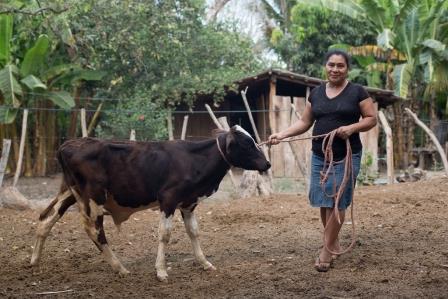What’s at “Steak?” The Need for a Just and Sustainable Global Food System

This blog was originally published on countercurrents.org
Photo credit: Jason Taylor for Friends of the Earth International, 2013. CC License. Critical Information Collective.
Brazil’s recent rotten meat scandal once again puts a spotlight on the untrustworthy, underhanded methods of agribusiness — the industry will do anything for profit, and it will use money and political clout to get away with it.
Such cases make it clear that this industry cannot be trusted; who knows how many other cases go on unnoticed. If we are serious about our loved ones’ and our planet’s well-being, then we must not only regulate the meat industry, but actively replace it by local and healthy alternatives that people can trust.
For those that haven’t caught up on the latest fiasco, JBS, Brazil’s biggest beef exporter, and BRF, the biggest poultry exporter — two of the most powerful meat companies in the world — had been selling and exporting rotten meat for years. They used chemicals to mask the meat’s rancid state, and mixed things like cardboard into chicken meat to increase volume. They got away with it by bribing government officials in exchange for fraudulent sanitary licenses, and even top political parties, including Brazilian President Temer’s PMDB, received a share of the spoils.
Food fraud by the industry is hardly new. Just last month, Subway was under the spotlight forits chicken, which turned out to have only 50 percent chicken DNA. The rest, as it turned out, was soy. Taco Bell was sued under allegations that its beef was just 35 percent beef. Both Ikea’s meatballs and Tesco’s burgers were pulled off shelves for containing horse meat. An exposé by the Guardian revealed a murky criminal nexus behind this horse trade, with stories of migrants being paid in cash to defrost years old “green” frozen meat, which was sent to some of the leading European suppliers.
The industry’s workers’ and animal rights’ records are not stellar either. One of the largest of them all, Tyson’s poultry workers are forced to wear diapers because going to the bathroom would slow down production. In many slaughterhouses, jaded and frustrated workers had become so desensitized to violence that they hacked away at live animals with blunt knives, put out cigarettes on their faces, or kicked and punched them. Being rewarded for killing for many hours a day can warp someone’s behavior. Enough has been written about the industry’s environmental and climate costs; the Global Forest Coalition, for instance, has published several reports. Supermarket shelves today are lined by such questionably produced meat.
The unfortunate part is that this industry receives lucrative subsidies by governments across the world in the name of feeding a growing population. Yes, the population is growing, and yes, it must be fed, but there really do exist healthier and just alternatives, and we must start thinking about changing the way we produce meat and how much of it we eat.
People’s movements and campaigns across the world have started some of that work for us — they have started to imagine what that change could look like. They point toward sustainable, small-scale local food systems, agroforestry and pastoralist systems where Mother Earth and the farmers and communities who produce our food are at the heart. They ask for a reform of state policies to support such local trustworthy food, instead of destructive industrial meat. Most importantly, they also ask consumers to reconsider the need to follow a meat laden western industrial diet and look towards healthier local vegetarian options. Even small cuts go a long way for the planet and its animals, not to mention improve our health.
Copyright, Truthout. May not be reprinted without permission.
ASHLESHA KHADSE
Ashlesha Khadse is a livestock researcher for the Global Forest Coalition. She contributed to a recent report on the real cost of industrial meat, titled “What’s at Steak.” She is also a member of Amrita Bhoomi, a peasant agroecology school in southern India, which is part of La Via Campesina’s agroecology schools network.







